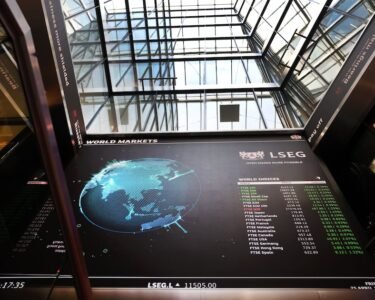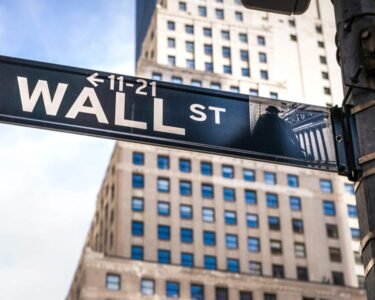U.S. stocks ended the day higher Wednesday — but saw earlier gains evaporate as investors measured White House officials’ softening tariff and trade stance against hard-line postures from other countries.
The S&P 500 finished up 1.7% after having earlier climbed as high as 3.2%. The tech-focused Nasdaq closed up 2.5% after surging 4.1%. The Dow Jones Industrial Average gained about 400 points, or 1.1%, after adding as many as 1,000 points or nearly 3% earlier.
Since President Donald Trump’s election in November, the S&P 500 is now down 7%, and about 13% lower from the highs seen in February.
Stocks had opened higher Wednesday after Trump said he would likely dial back the harsh tariffs he had set for Chinese products. Markets were also encouraged after he said he would not make an immediate change in leadership at the Federal Reserve.
A key change in the White House’s stance on tariffs came amid warnings from companies this week about potential product shortages and empty shelves, according to a person familiar with the White House’s thinking.
The tariffs have made it prohibitively expensive to bring products into the country. As a result, many firms have simply halted imports, the person said.
The White House is particularly concerned about shortages of products around the holidays, the person said. The Christmas ordering cycle is starting and July Fourth is coming up, and retailers might not have the summer products like beach chairs, umbrellas, grills, fireworks or light-up trinkets.
After the closing bell, Chipotle reported same-store sales had declined year-on-year for the first time since the pandemic as it warned about a spending “slowdown” among its customers.
Still, White House officials cautioned that the tariffs would remain in place for the time being. Treasury Secretary Scott Bessent clarified later Wednesday morning that while he viewed the current tariffs stand-off as “unsustainable,” any de-escalation would have to be mutual.
“I think that point there would have to be a de-escalation by both sides,” Bessent said.
Asked if there was any incoming unilateral offer from Trump to China on tariffs, Bessent replied, “Not at all.”
He added that he would be “surprised” if there was a discussion about tariffs coming down by as much as 50%, as a report Wednesday in The Wall Street Journal indicated.
On Tuesday, Trump said that U.S. tariffs on China would “come down substantially but it won’t be zero.”
A representative for the Chinese embassy in the U.S. continued to condemn the Trump administration’s approach.
“Our doors are open if the U.S. wants to talk,” the spokesperson said in a statement Wednesday. “If a negotiated solution is what the U.S. truly wants, it should stop threatening and blackmailing China and seek dialogue based on equality, respect and mutual benefit. To keep asking for a deal while exerting extreme pressure is not the right way to deal with China and simply will not work.”
Markets had been further cheered after Trump said Tuesday he had “no intention” of firing Federal Reserve Chair Jerome Powell, despite calling him a “major loser” and “Mr. Too Late” the day before — a reference to what Trump perceives as dawdling in lowering interest rates.
Economists had warned that any threat to the central bank’s independence would upend global markets and cause U.S. borrowing rates to surge.
Stocks remain about 13% off of the highs seen in January, just after Trump’s inauguration. Markets remain bruised — perhaps indefinitely so — by Trump’s erratic policymaking.
Trump changes-of-mind have been a constant of his second term, and there was nothing to suggest that the latest evolution of his thinking would be final.
“With investor concerns growing, U.S. President Trump demonstrated the art of the retreat,” Paul Donovan, chief economist of UBS Global Wealth Management, said in a note to clients.
He continued: “Nonetheless, the erratic threaten-retreat-threaten-retreat cycle has economic consequences. The uncertainty this causes may impact consumer and business decision-making.”
Some commentators believe a more lasting shift by foreign investors away from holding U.S. assets has already begun.
“The U.S. faces a coming adjustment to a lower pace of foreign capital inflows to US asset markets,” Bob Elliott, co-founder, CEO and chief investment officer at the Unlimited Funds asset management group, said in a post on X Wednesday.
Tech shares were boosted by comments from Elon Musk, the CEO of the electric carmaker Tesla, during the company’s first-quarter earnings report to investors Tuesday afternoon.
While the company said profits had shrunk dramatically in the first-three months of the year, Musk said he was actively winding down his role advising the Department of Government Efficiency, the quasi-official Trump project that has upended the federal workforce.
“Musk made a huge move forward as his time in DOGE/White House now winds down and he will be laser focused on Tesla again,” Dan Ives, managing director at Wedbush Securities, said on X Wednesday. “Musk finally read the room and made a pivot which helps remove the black cloud over Tesla. New chapter begins.”
Ives said his new long-term price target for Tesla’s stock was $350; as of Tuesday, the stock had closed at about $238, implying a 47% gain.
Others remained cautious that Tesla could recover in a short amount of time from the 50% drop its share price has seen over the past several months. On the earnings call with investors, Musk said the company was still on track to roll out commercially viable robotaxis, humanoid robots and full-self-driving capabilities.
“We remind investors that TSLA has historically delivered stunning technical achievements, but often delivered later than initially promised,” analysts with the Truist financial group said in a note to clients. “We maintain an open mind.”




